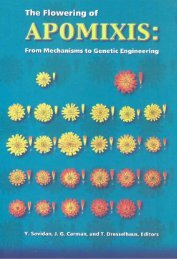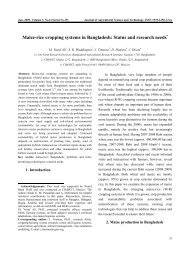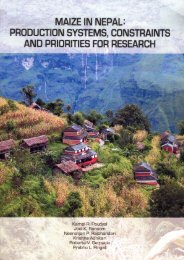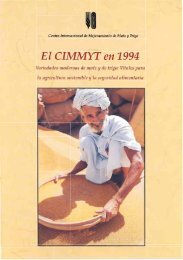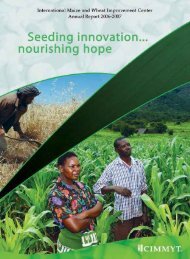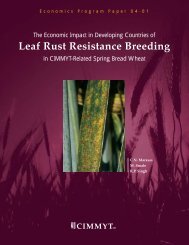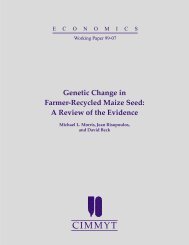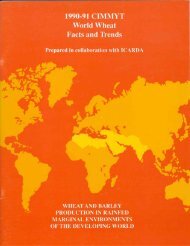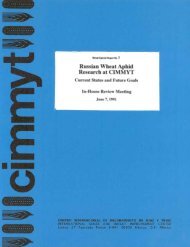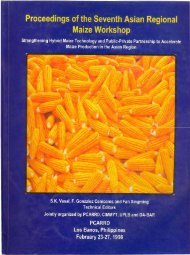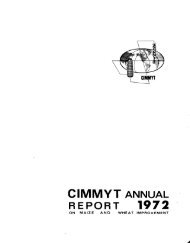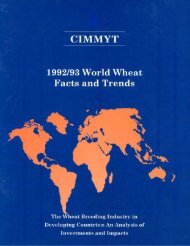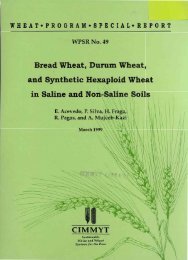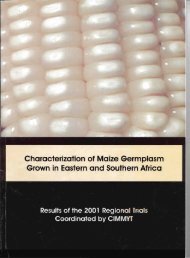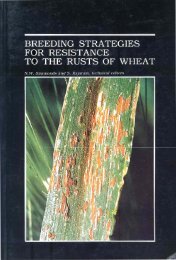Research Highlights of the CIMMYT Wheat Program 1999-2000
Research Highlights of the CIMMYT Wheat Program 1999-2000
Research Highlights of the CIMMYT Wheat Program 1999-2000
You also want an ePaper? Increase the reach of your titles
YUMPU automatically turns print PDFs into web optimized ePapers that Google loves.
Five participants thought <strong>the</strong> level <strong>of</strong> instructional<br />
materials was about right, while one found <strong>the</strong>m<br />
somewhat difficult. All participants felt <strong>the</strong><br />
curriculum was well planned, highly organized,<br />
and very relevant to <strong>the</strong>ir current work and<br />
responsibilities. The “Reference Manual” was<br />
found extremely useful and informative. On <strong>the</strong><br />
duration <strong>of</strong> <strong>the</strong> course, three participants felt that<br />
five weeks was about right, while <strong>the</strong> o<strong>the</strong>r three<br />
felt that 6-8 weeks would be ideal. They also<br />
commented that one week for collecting<br />
germplasm was too short; <strong>the</strong>y needed at least two<br />
weeks to study <strong>the</strong> materials, harvest, and process<br />
<strong>the</strong> selected materials for shipment. They all felt<br />
that <strong>the</strong> lecture followed by demonstration/<br />
practical teaching methodology used by most staff<br />
was very effective. On language ability, training in<br />
class and field, and interpersonal relations, all<br />
participants found <strong>the</strong>ir trainers competent to very<br />
competent. As for <strong>the</strong> weekly program,<br />
participants suggested scheduling at least half a<br />
day to interact, discuss, or follow up on topics <strong>of</strong><br />
special interest with staff and to use <strong>the</strong> library.<br />
All trainees felt that <strong>the</strong> wheat improvement<br />
technologies learned during <strong>the</strong> course were very<br />
appropriate to home-country conditions. They also<br />
believed <strong>the</strong>ir abilities as wheat scientists had<br />
improved after <strong>the</strong> course. Their expectations in<br />
terms <strong>of</strong> making international friends/or contacts,<br />
collecting new reference materials and<br />
publications, having <strong>the</strong> opportunity to travel, and<br />
saving some money were satisfied. As for<br />
continued support from <strong>CIMMYT</strong>, most<br />
participants felt that receiving new publications<br />
and returning to <strong>CIMMYT</strong> as visiting scientists<br />
after several years would be most useful.<br />
The participants made <strong>the</strong> following comments:<br />
• Course curriculum was complete and covered very<br />
important topics.<br />
• The “lecture followed by practical application”<br />
format employed during <strong>the</strong> course was very<br />
effective.<br />
• The Reference Manual very useful, informative,<br />
and excellent pre-lecture material.<br />
• Participants appreciated <strong>the</strong> opportunity to give a<br />
presentation or seminar on his/her own research<br />
work.<br />
• Participants appreciated having at least half a day<br />
per week <strong>of</strong> free time to seek one-to-one<br />
discussions with staff on specific issues and to use<br />
<strong>the</strong> library.<br />
They also made some valuable suggestions and<br />
pointed out some positive aspects <strong>of</strong> <strong>the</strong> course:<br />
• More brainstorming or discussion sessions on key<br />
wheat improvement issues.<br />
• More opportunities to practice special techniques<br />
(e.g., use <strong>of</strong> IWIS and alpha lattice analysis).<br />
• Extending <strong>the</strong> germplasm collection period to two<br />
weeks.<br />
• Excellent schedule <strong>of</strong> field trips and weekend<br />
activities.<br />
• Loving and caring behavior <strong>of</strong> <strong>the</strong> organizer.<br />
• Course organization was very good.<br />
Finally, participants felt <strong>the</strong> advanced course is<br />
unique and effective in increasing <strong>the</strong> expertise <strong>of</strong><br />
those who attend. Fur<strong>the</strong>rmore, <strong>the</strong>y recommended<br />
that a greater number <strong>of</strong> active scientists from<br />
developing nations be given <strong>the</strong> opportunity to<br />
visit Mexico and contribute to and pr<strong>of</strong>it from<br />
<strong>CIMMYT</strong>’s wheat research program.<br />
<strong>Program</strong> Outlook<br />
The need for good germplasm is obvious, as is <strong>the</strong><br />
need for highly trained scientists, capable <strong>of</strong><br />
selecting superior varieties and determining <strong>the</strong><br />
most adequate and efficient practices that allow<br />
farmers to obtain stable, superior yields. Welltrained<br />
scientists are essential to <strong>the</strong> progress <strong>of</strong><br />
national agricultural research programs in <strong>the</strong><br />
developing world. <strong>CIMMYT</strong> will continue to <strong>of</strong>fer<br />
<strong>the</strong> advanced wheat improvement course to help<br />
NARS staff achieve <strong>the</strong>ir goals. The Center is also<br />
committed to assisting national training programs<br />
wherever and whenever possible. In conclusion,<br />
<strong>CIMMYT</strong>’s wheat training program will respond to<br />
and anticipate <strong>the</strong> training needs <strong>of</strong> national wheat<br />
scientists by providing opportunities tailored to<br />
<strong>the</strong>ir specific circumstances.<br />
72



